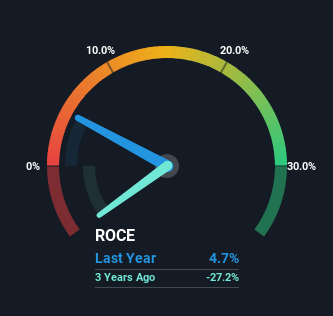What are the early trends we should look for to identify a stock that could multiply in value over the long term? Firstly, we'd want to identify a growing return on capital employed (ROCE) and then alongside that, an ever-increasing base of capital employed. If you see this, it typically means it's a company with a great business model and plenty of profitable reinvestment opportunities. Having said that, from a first glance at Dutch Bros (NYSE:BROS) we aren't jumping out of our chairs at how returns are trending, but let's have a deeper look.
Understanding Return On Capital Employed (ROCE)
If you haven't worked with ROCE before, it measures the 'return' (pre-tax profit) a company generates from capital employed in its business. The formula for this calculation on Dutch Bros is:
Return on Capital Employed = Earnings Before Interest and Tax (EBIT) ÷ (Total Assets - Current Liabilities)
0.047 = US$106m ÷ (US$2.4b - US$180m) (Based on the trailing twelve months to September 2024).
So, Dutch Bros has an ROCE of 4.7%. In absolute terms, that's a low return and it also under-performs the Hospitality industry average of 9.1%.
View our latest analysis for Dutch Bros

Above you can see how the current ROCE for Dutch Bros compares to its prior returns on capital, but there's only so much you can tell from the past. If you'd like to see what analysts are forecasting going forward, you should check out our free analyst report for Dutch Bros .
What Can We Tell From Dutch Bros' ROCE Trend?
The trend of ROCE doesn't look fantastic because it's fallen from 8.6% four years ago, while the business's capital employed increased by 1,126%. That being said, Dutch Bros raised some capital prior to their latest results being released, so that could partly explain the increase in capital employed. It's unlikely that all of the funds raised have been put to work yet, so as a consequence Dutch Bros might not have received a full period of earnings contribution from it.
On a related note, Dutch Bros has decreased its current liabilities to 7.4% of total assets. So we could link some of this to the decrease in ROCE. Effectively this means their suppliers or short-term creditors are funding less of the business, which reduces some elements of risk. Since the business is basically funding more of its operations with it's own money, you could argue this has made the business less efficient at generating ROCE.
The Key Takeaway
In summary, despite lower returns in the short term, we're encouraged to see that Dutch Bros is reinvesting for growth and has higher sales as a result. These growth trends haven't led to growth returns though, since the stock has fallen 24% over the last three years. So we think it'd be worthwhile to look further into this stock given the trends look encouraging.
Like most companies, Dutch Bros does come with some risks, and we've found 1 warning sign that you should be aware of.
While Dutch Bros isn't earning the highest return, check out this free list of companies that are earning high returns on equity with solid balance sheets.
New: Manage All Your Stock Portfolios in One Place
We've created the ultimate portfolio companion for stock investors, and it's free.
• Connect an unlimited number of Portfolios and see your total in one currency
• Be alerted to new Warning Signs or Risks via email or mobile
• Track the Fair Value of your stocks
Have feedback on this article? Concerned about the content? Get in touch with us directly. Alternatively, email editorial-team (at) simplywallst.com.
This article by Simply Wall St is general in nature. We provide commentary based on historical data and analyst forecasts only using an unbiased methodology and our articles are not intended to be financial advice. It does not constitute a recommendation to buy or sell any stock, and does not take account of your objectives, or your financial situation. We aim to bring you long-term focused analysis driven by fundamental data. Note that our analysis may not factor in the latest price-sensitive company announcements or qualitative material. Simply Wall St has no position in any stocks mentioned.
About NYSE:BROS
Dutch Bros
Operates and franchises drive-thru shops in the United States.
High growth potential with solid track record.
Similar Companies
Market Insights
Community Narratives




